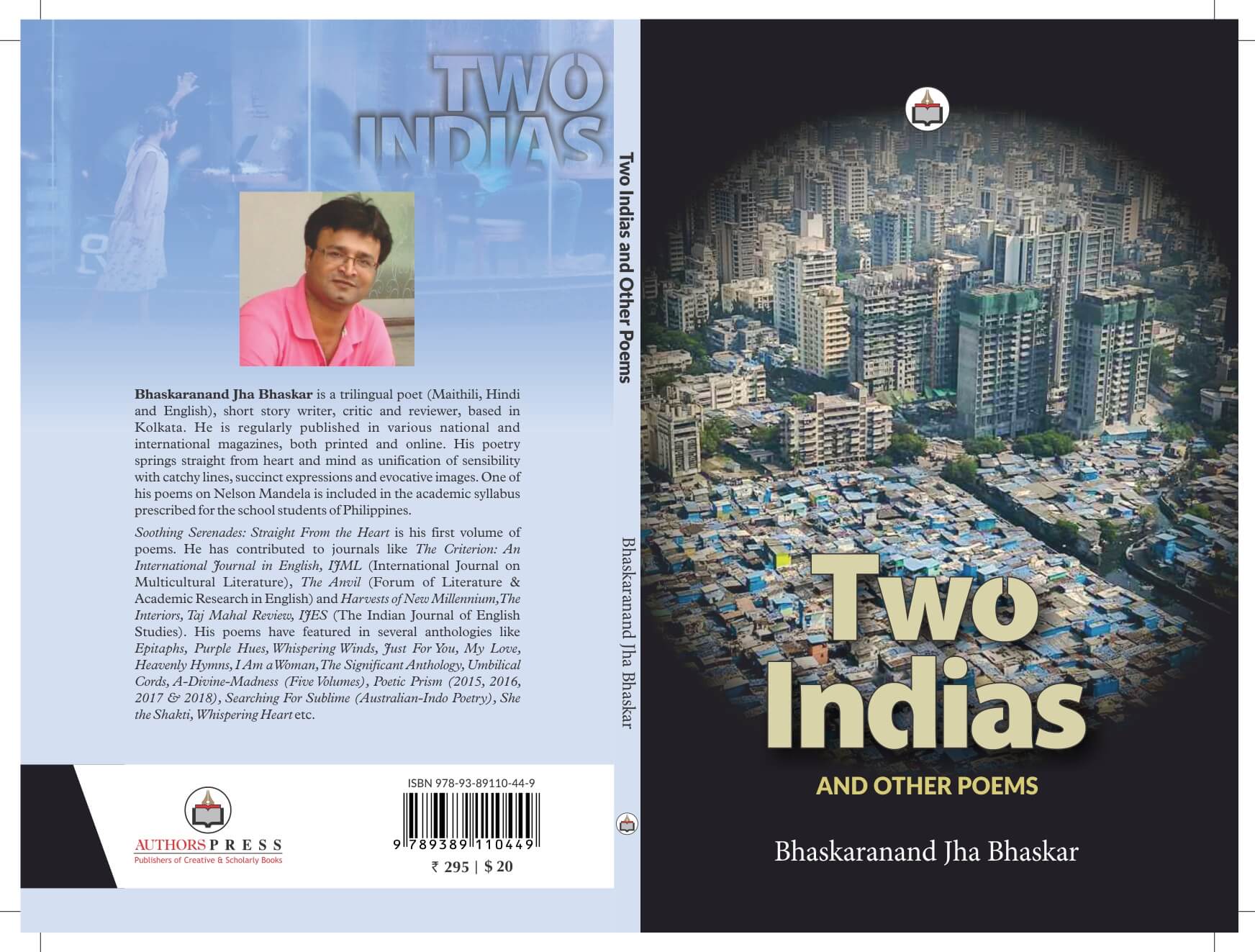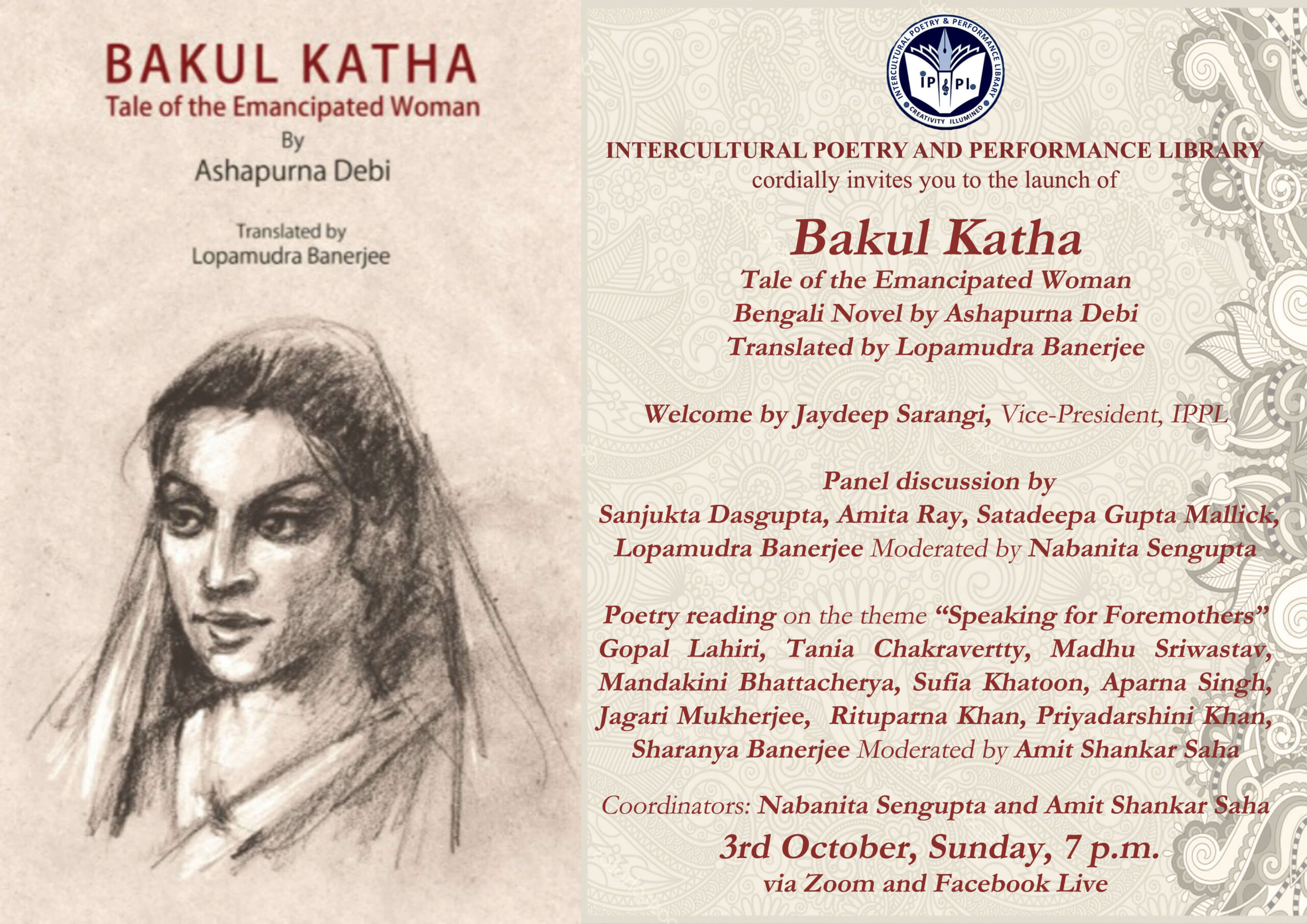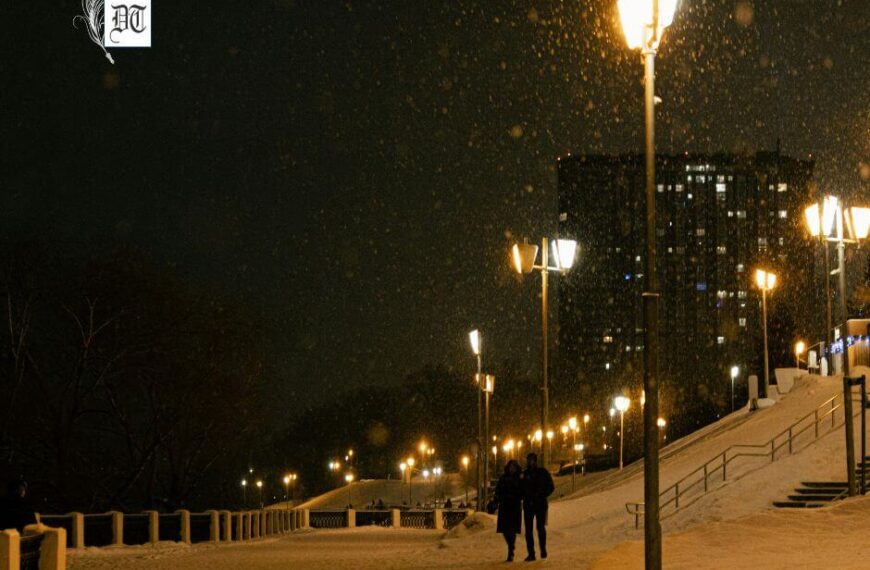Mamta reviews Bhaskaranand Jha Bhaskar’s book of poetry, Two Indias and Other Poems. An exclusive for Different Truths.
Bhaskaranand Jha Bhaskar is a young and dynamic poet basking in the poetic glow with his marvelous utopian vision, gleaming thoughts, and exuberant feelings. He, through his second poetry collection, Two Indias and Other Poems, does not want his readers to borrow his eyes, whereas he tries to invoke public consciousness about values, beliefs, and capabilities, and thus wants them to enter his mind.
In other words, Bhaskar expects his readers to develop their own point of view to perceive the aesthetic texture of his poetic structures. He is a man of powerful diction, with the profound use of metaphor. He not only proffers the imaginative freedom to the readers but also provides them immense scope of sense and sensibility. The book is a collection of eighty-one poems, which express various perspectives on myriad concerning issues.
The poet is a good observer who sees latent pain. He appreciates the good prevailing in man or culture and accepts the reality of the new world. Two Indias and Other Poems draws the images of the highly competent poet’s axiom, which reminds of a French novelist Gustave Flaubert’s line, “The art of writing is the art of discovering what you believe.” This can be well understood by going through Bhaskar’s poems.
The title of the book is justified by the palpable issues, which assert the Daoism theory of the universe. The concept talks about two different poles, two objects complementing each other. If one is good then other is bad, one being dark then the other light, one side poor then the rich on the other. The title itself reflects the emerging paradigm of two situations, one being good and the other in need of intellectual concern. The poet is a man of concern, and the ‘ethical obligation’ is apt in his collection of poems.
Bhaskar, the poet with his well-articulated words creates an imagery that is striking and evocative. Since independence we have been witnessing various issues but unless we all come forward together for the betterment, the system will not improve and moreover in the hands of few such dominators, rest too would demolish. For the upliftment of mankind alone each one has to be sensible. People residing at the same place need to be united by thoughts such as “United we stand and divided we fall.” The poem entitled, Two Indias, advocates the same. The poem connotes the situation before and after the independence:
India under the tyrannical rule
Sobbed and heaved
Yet her people were united
...
India under the democratic rule
Still sobs and heaves
For her people are divided "
(Two Indias; p22)
Independence was not a free win play; in fact, it was a long journey of pain and suffering. The poem entitled ‘1947’ talks about the pain of separation at the time of freedom, how the first speech of the first Prime Minister brought a new hope and how it has turned nowadays.
She was partitioned into two -
Two big pieces of heart
...
So-called ‘Tryst with Destiny’
Phenomenally brought forth with a bang
A new dawn of freedom-
The free dome of sumptuous spree
But only for a few mean mongers –
(1947; pp 23-24 )
And the regular showcase of election continues with no improvement:
So bizarre is the dance
of our democracy –
the biggest game people play
with their politicians
through rounds of elections
(Dance of Democracy; p 49)
The poet does not forget to remember and pay tribute to great personalities like Mahatma Gandhi, Lal Bahadur Shastri, Atal Bihari Vajpayee, Dr. A P J Abdul Kalam and Maharajadhiraj Kameshwar Singh and Maithil Kavi Kokil Vidyapati. The poet, if at once remembers the great efforts of our freedom fighters and their words then at the same time appreciates the contributions of those in developing country too.
Gandhi and Shastri
The greatest figures of the nation
...
Thanks to both ....
...
Gandhi's love and non-violence
And Shastri’s Jai Jawan, Jai Kisan slogan
We hold them in high esteem
As our idols and nationalistic paragon."
(October 2: Birthday of Two Idols; p 25)
Let’s hope another lotus blooms
Out of the distinguished ashes of Atal’s.
(A Tribute to Atal Bihari Vajpayee; p 38)
Where science in you
had a cordial tryst
with paradigmatic spirituality
in your impeccable heart."
(In Memory of Dr. APJ Abdul Kalam; p 40)
Contributing more to overall growth
He cradled the scholars and the bards.
(Tribute to Maharajadhiraj Kameshwar Singh; p 50)
O, Bard of Love, philosopher of selfless devotion, metaphysics of life and death
You do sustain the entire gamut of vibrant cultures, enticing art and right rituals of Mithila ...
(Maithil Kavi Kokil Vidyapati; p 78)
The poet belongs from the land of Mithila and his love for his native place cries seeing the downfall due to the indifference and narrow mindedness. “The heritage’s riches and vibrant culture now lies in ruins, starved and poor,” says the poet and the reason he sees is:
Vultures of casteism are looming large and larger
Eating into the vibrant culture and amicable ambiance of Mithila!"
(Mithila: Land Left in Lurch; p 76)
Tested by the crude politics of the time
Even Rama had to feel demoralized and humiliated by the purity of the heart and soul of a Maithilani ...
(Sobbing Sita; p 74)
The poet, through the following lines of his poems, seems to have the belief that the pride of Mithila dwells in each Maithils (People of Mithilanchal):
With cultural ethos of Mithila
...
For a prideful head to the fore
Let's all be Maithils to the core."
(Resurgent Mithila; p 79)
It would be very uncertain if we consider that the poet stops here, in fact his sensibility smells the situational smoke in and around the country. Oh, Delhi!, Bleeding Roses of Kashmir, Smiling Buddha Bleeds, Sad Santa Silently Departs, etc. discusses about the growing sick mentality of this generation which is shameful.
Veiled in their invisible selfishness
They have an eyewash for the masses.
(Black Sheep of Politics; p 36)
The poet has, in fact, very effectively tried to deliver a strong message of ethical obligation to his readers:
The poor have no options
To escape their long traps,
Oft victimized they do feel
By the men in white drapes."
(Hounds of Politics; p 45)
Lost long back
In the labyrinth of greed:
Content and Peace.
(Content and Peace; p72)
The immense meaning lies between and beyond his lines which keeps on haunting the mind of the readers. “Pen is mightier than the sword,” penned by English author Edward Bulwer-Lytton in 1839, indicating that communication or advocacy of an independent press, is a more effective tool than direct violence. It seems that Bhaskar too implies the same formula and tries to awake the genre of intellectuals through his thought-provoking words.
On long mast of the power
the flag was hung once again
to be hanged bit by bit later
(Republic; p 55)
Unchanging system of politics
remains unchanged
even if you change
Yourselves
Your shelves
Your gender,
fast colour,
principled attitude,
and the unroyal loyalty
for the prospect
of some royal royalty!"
(Award-Wapsi; p 53 )
A common man
Can't be pushed off to the edge
Nor his ordinary power ...
(Power of a Common Man; p 37 )
Another big concern obvious in the collection is about the pathetic situation of females. From sexual assaults to domestic violence, it has been a major concern. Since long feminism has been a sensitive and sensational topic but till date no improvement has been observed in this regard. The atrocious and appalling circumstances still prevail in society. The following lines of his poems are enough to tell us about the erudite soul of the poet:
As a punishment to be born
A mere helpless girl?
Unprotected, all unsecured
In their own volatile turf
Be it home, society, state or country
(Sexual Assaults; p 34)
He further writes,
In the society of male egos,
Man always dominates woman
Who is always at the receiving end
Or pushed into a dungeon alley.
(Mamta: Woman of Substance; p 87 )
The poet is seen stubborn with the gradual change in faith and virtues.
Today faith is diseased
And conviction deceased.
(Durga: Goddess in Distress; p102)
With the idol immersed
faith, sanctity, virtues, reverences,
human and spiritual values
lie drowned deep,
not to surface in our life?
(Immersion; p103)
Every good or bad happening brings changes. So is the evolutionary theory with amazing changes. It might be a strange world for many but for some a unique world of their own. We say that such cultures are borrowed from the West and not good for the society. The poet in his Queer Theory seems to agree with the same:
In the mysterious garb of emotional intimacy
Under the spell of perverted love?
Borrowed from the distorted cultures
Of the West with ultra-modernity at worst!"
(Queer Theory; p 93)
but also, he is not against the love be it gay or lesbian.
Let them live and relive
Making the best use of their time
So that they can bridge up
The void of racial hatred
...
Let free love flow freely..."
(Gays and Lesbians; p 94)
It is hard for all those, badly affected, to cope up with the natural calamities. The poet through Flood, Water Crisis, The Earthquake Can’t Shake Our Spirit talks about the overcoming nature of humans. But what about the worst situation created due to politicians and politics? Will we be able to overcome this censorious situation ever? The poet through Freedom is Chained, Political Brouhaha, Dog Culture, Indian Demagogue, Gobin of Greed and Pseudo-Secular tries to aware his readers by bringing forth the incoherent political situations in front of them in a very simple way where the affluence of phraseology is striking.
In a free reign of terrific terror
in the dark den
of the few -
the vulturine owls,
elected to rule the roost
of corruptions,
of vested interests.
(Freedom is Chained; p 67)
The poetry book has various segments of our society. The poet, not forgetting the varied culture, has mentioned some of the major festivals too but to evoke the conscience of mankind.
Agomoni of the primordial energy-
The time of deep contemplation
Over our existential modus operandi
...
Let’s invoke mother goddess
To arrive from the infinite ocean of consciousness ...
(Agomoni - Arrival of Mother Goddess; p 101)
Chhath Puja -
Time to offer obeisance
To the sun of the sky and our heart...."
(Chhath Puja; p 92)
Bhaskar plays with the words in terms of multilingualism and his genius is obvious in almost all of his poems. His poems are the examples of his linguistic ingenuity and eclecticism. Going through the poem, Railway Platform, the readers can enjoy the savoury taste of his writing style:
First, fast and fittest
Countless sperms crawl in the ovum
Of the pregnant platform ..."
(Railway Platform; p 109)
The poet hypothesises the idea survival of the fittest that originated from Darwinian evolutionary theory:
Zeal to survive in the world
Is what matters most,
More than anything else
In existential life.
Survival of the fittest
Is the sole motto and dictum "
(Survival of the Fittest; p 48)
Bhaskar is with no doubts one of the most talented contemporary poets we have. His poetry is not merely a way of expressing his thoughts but also one of understanding the changing times around him. He takes a stand up to his beliefs and writes for peace, change, rights, and revolution.
Two Indias and Other Poems is worth having in one’s personal shelf of likings. Readers will get various tastes all together in one book whether it is about powerful diction, use of poetic devices or soulful rhythms. Dealing with socio-political concern, awarding the bravery with heartfelt words, enjoying the varied culture, crying over the female-violence or talking about the cosmic balance, the book has all in it for the readers to fall in love with it.
Finally, and most importantly, he ironically offers a message, a floral tribute indeed:
Those who follow don’t lead;
Those who leads don't 'follow'.
(Page 20)
Visual sourced by the reviewer





 By
By

 By
By
 By
By